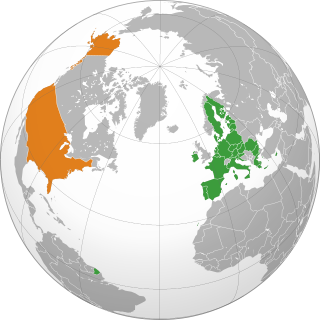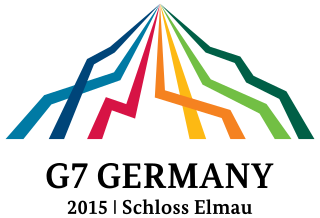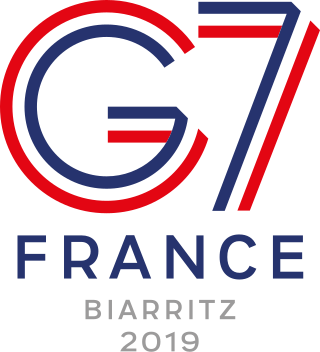
The Group of Eight (G8) was an inter-governmental political forum from 1997 until 2014. It had formed from incorporating Russia into the Group of Seven, or G7, and returned to its previous name after Russia was expelled in 2014.

A great power is a sovereign state that is recognized as having the ability and expertise to exert its influence on a global scale. Great powers characteristically possess military and economic strength, as well as diplomatic and soft power influence, which may cause middle or small powers to consider the great powers' opinions before taking actions of their own. International relations theorists have posited that great power status can be characterized into power capabilities, spatial aspects, and status dimensions.

In international relations, regional power, since the late 20th century has been used for a sovereign state that exercises significant power within a given geographical region. States that wield unrivaled power and influence within a region of the world possess regional hegemony.
European integration is the process of industrial, economic, political, legal, social, and cultural integration of states wholly or partially in Europe, or nearby. European integration has primarily come about through the European Union and its policies.

The Group of Seven (G7) is an intergovernmental political and economic forum consisting of Canada, France, Germany, Italy, Japan, the United Kingdom and the United States; additionally, the European Union (EU) is a "non-enumerated member". It is organized around shared values of pluralism, liberal democracy, and representative government. G7 members are the major IMF advanced economies.

The G4 nations, comprising Brazil, Germany, India, and Japan, are four countries which support each other's bids for permanent seats on the United Nations Security Council. Unlike the G7, where the common denominator is the economy and long-term political motives, the G4's primary aim is the permanent member seats on the Security Council. Each of these four countries have figured among the elected non-permanent members of the council since the UN's establishment. Their economic and political influence has grown significantly in the last decades, reaching a scope comparable to the permanent members (P5). However, the G4's bids are often opposed by the Uniting for Consensus movement, and particularly their economic competitors or political rivals.

Reform of the United Nations Security Council (UNSC) encompasses five key issues: categories of membership, the question of the veto held by the five permanent members, regional representation, the size of an enlarged Council and its working methods, and the Security Council-General Assembly relationship. The Member States, regional groups and other Member State interest groupings developed different positions and proposals on how to move forward on this contested issue.

Relations between the European Union and the United States began in 1953, when US diplomats visited the European Coal and Steel Community in addition to the national governments of its six founding countries. The two parties share a good relationship which is strengthened by NATO, cooperation on trade, and shared values.

The bilateral relations between the Italian Republic and the United Kingdom of Great Britain and Northern Ireland are warm and exceptionally strong. This relationship is also known as Anglo–Italian relations.

The G6 in the European Union was an unofficial group of the interior ministers of the six European states —France, Germany, Italy, Poland, Spain, and the United Kingdom—with the largest populations and thus with the majority of votes in the Council of the European Union. The G6 was established in 2003 as G5 to deal with immigration, terrorism, and enforce law and order. In 2006, Poland joined the group, making it the G6. On 29 March 2017, the United Kingdom triggered Article 50, and left the European Union entirely on 31 January 2020, ending the G6, and beginning the G5 without the United Kingdom.

Relations between the European Union (EU) and the United Kingdom of Great Britain and Northern Ireland (UK) are governed, since 1 January 2021, by the EU–UK Trade and Cooperation Agreement (TCA).
The EU three, also known as EU big three, EU triumvirate, EU trio or simply E3, refers to France, Germany and Italy, a group that consists of the three large founding members of the European Union.

The 40th G7 summit was held 4–5 June, 2014 in Brussels, Belgium. It was originally scheduled to be held as the “40th G8 summit” and be hosted by Russia in the Black Sea resort of Sochi. However, the other seven countries decided on 24 March that the summit would be instead held without Russia in Brussels.

The 41st G7 summit was held in Schloss Elmau, Krün, Bavaria, Germany on 7–8 June 2015. In March 2014 the remaining members of the G8 declared that a meaningful discussion was currently not possible with Russia, and since then meetings have continued under the G7 name.

The Quint is an informal decision-making group consisting of the United States and the Big Four of Western Europe. All the countries forming it are allies and members of NATO, the OECD and the G7/G20.

The 42nd G7 summit was held on 26–27 May 2016 at the Shima Kanko Hotel in Kashiko Island, Shima, Mie Prefecture, Japan. In March 2014, the G7 declared that a meaningful discussion was currently not possible with Russia in the context of the G8. Since then, meetings have continued within the G7 process.

The 43rd G7 summit was held on 26–27 May 2017 in Taormina (ME), Sicily, Italy. In March 2014, the G7 declared that a meaningful discussion was currently not possible with Russia in the context of the G8. Since then, meetings have continued within the G7 process.
International reactions to the United Kingdom European Union membership referendum of 2016 are the reactions to the decision to leave the European Union by the United Kingdom. The main reaction was on global financial markets experiencing extreme volatility.

The 45th G7 summit was held on 24–26 August 2019, in Biarritz, France. In March 2014, the G7 declared that a meaningful discussion was currently not possible with Russia in the context of the G8. Since then, meetings have continued within the G7 process. However, according to a senior Trump administration official, US President Donald Trump and French President Emmanuel Macron had agreed that Russia should be invited to the next G7 Summit to be held in 2020.




















